
Resonance-Journal of Science Education
Scope & Guideline
Cultivating Excellence in Science Education Since 1996
Introduction
Aims and Scopes
- Interdisciplinary Science Education:
The journal focuses on integrating various fields of science, including physics, chemistry, biology, and mathematics, to provide a holistic educational experience. - Innovative Teaching Methods:
It highlights novel teaching strategies and tools, such as computational methods, interactive simulations, and inquiry-based learning approaches to enhance student engagement. - Historical and Biographical Perspectives:
The journal often includes historical accounts and biographical sketches of notable scientists, providing context to scientific advancements and inspiring future generations. - Application of Science in Real-world Scenarios:
Articles frequently discuss the application of scientific principles in everyday life, emphasizing relevance and practical understanding of complex concepts. - Exploration of Emerging Scientific Themes:
The journal maintains a focus on trending scientific topics, ensuring that readers are informed of the latest developments and innovations in various scientific domains.
Trending and Emerging
- Computational and Digital Tools in Education:
There is an increasing emphasis on the use of computational tools and digital resources, such as coding and simulations, to enhance learning experiences and engage students in scientific inquiry. - Interdisciplinary Research and Collaboration:
The journal is promoting collaborative research efforts that combine insights from multiple scientific disciplines, encouraging a more integrated understanding of complex scientific issues. - Sustainable Science Education Practices:
Emerging themes around sustainability and environmental science are becoming more prevalent, reflecting a growing awareness of global challenges and the role of science education in addressing them. - Focus on Student-Centric Learning:
An increasing number of articles are focusing on student-centered learning methodologies, such as project-based learning and inquiry-based approaches, which prioritize student engagement and active participation. - Integration of Modern Scientific Discoveries:
The journal is increasingly featuring discussions on modern scientific discoveries, including advancements in fields like biotechnology, nanotechnology, and quantum physics, and their implications for education.
Declining or Waning
- Traditional Lecture-based Teaching:
There has been a noticeable decrease in articles promoting traditional lecture-based teaching methods, reflecting a broader trend towards more interactive and student-centered learning approaches. - Basic Theoretical Papers:
Papers that focus solely on theoretical frameworks without practical applications are becoming less common, as the journal increasingly prioritizes research that demonstrates real-world relevance. - Narrowly Defined Scientific Disciplines:
The journal appears to be moving away from articles that focus exclusively on narrow scientific disciplines, favoring interdisciplinary approaches that integrate multiple fields of study. - Historical Analysis without Contemporary Relevance:
While historical perspectives are still valued, there is a waning interest in analyses that do not connect past scientific developments to current educational practices or scientific understanding. - Overly Specialized Content:
There is a reduction in highly specialized content that targets only a niche audience, indicating a shift towards more accessible articles that appeal to a broader readership.
Similar Journals
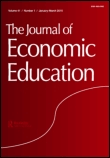
JOURNAL OF ECONOMIC EDUCATION
Exploring the Nexus of Economics and LearningJOURNAL OF ECONOMIC EDUCATION, published by Routledge Journals, Taylor & Francis Ltd, serves as a pivotal platform for the dissemination of research in the vital intersection of economics and education. With an ISSN of 0022-0485 and an E-ISSN of 2152-4068, this esteemed journal has been contributing to the field since 1969 and continues to evolve with influential insights projected through to 2024. Ranking in the Q2 category for both Economics and Econometrics, and Education as of 2023, it demonstrates a significant commitment to enhancing educational practices in economics. Researchers and educators alike will find value in its empirical studies, theoretical explorations, and innovative pedagogical approaches. Although currently not offering open access, the journal maintains a competitive reputation with a Scopus rank placing it in the 54th and 47th percentiles across its related fields. Join the scholarly dialogue that shapes the future of economic education and informs teaching methodologies across the globe.
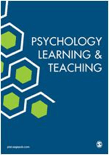
Psychology Learning and Teaching-PLAT
Inspiring dialogue and development in educational psychology.Psychology Learning and Teaching (PLAT) is a distinguished academic journal published by SAGE Publications Ltd, dedicated to advancing the field of educational psychology. With an ISSN of 1475-7257 and an E-ISSN of 2057-3022, this journal serves as a vital resource for researchers, educators, and practitioners seeking to explore innovative teaching methodologies and learning strategies within the context of psychology. As of 2023, its reputation is underscored by its Q1 ranking in Education and Q2 ranking in Psychology (miscellaneous), reflecting its significant contributions to the scholarly community. Placing an emphasis on empirical research and practical application, PLAT publishes research that not only enhances educational practices but also addresses contemporary psychological issues. Open access options facilitate widespread dissemination of knowledge, while its robust impact factor highlights its influence within the educational and psychological discourse. This journal is essential for anyone committed to the intersection of psychology and education, providing thought-provoking insights that inspire ongoing dialogue and development in the field.
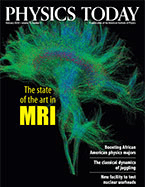
PHYSICS TODAY
Connecting Innovators in Physics and AstronomyPHYSICS TODAY is a prestigious journal published by the American Institute of Physics, serving as a pivotal platform for the dissemination of innovative research and developments in the field of physics and astronomy. With an ISSN of 0031-9228 and an E-ISSN of 1945-0699, this journal has been in circulation since 1948 and is set to continue until 2024. Recognized for its substantial contributions to the scientific community, PHYSICS TODAY holds a significant position within the Q2 quartile of the Physics and Astronomy category as of 2023. Although it does not offer open access, its articles remain crucial resources for researchers, professionals, and students seeking to stay abreast of the latest advancements across a broad range of topics in general physics and astronomy. With a current Scopus ranking of #150 out of 243 and a percentile standing at 38, the journal bolsters its reputation as a reliable source for high-quality scientific discourse. In an era of rapid scientific advancement, PHYSICS TODAY remains dedicated to fostering a deeper understanding of the physical universe, making it an essential read for those invested in the future of physics.
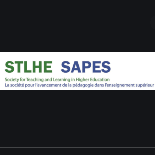
Canadian Journal for the Scholarship of Teaching and Learning
Enhancing Student Outcomes with Cutting-Edge PedagogyThe Canadian Journal for the Scholarship of Teaching and Learning (CJSoTL) is a premier open-access journal dedicated to advancing research and discourse in the field of teaching and learning within higher education. Published by SOC TEACHING & LEARNING HIGHER EDUCATION, CJSoTL serves as a vital resource for educators, researchers, and students alike, promoting evidence-based practices and scholarship in higher education pedagogy. Since its inception in 2010, the journal has provided an inclusive platform for innovative research, case studies, and pedagogical strategies that enhance teaching effectiveness and student learning outcomes. Although specific metrics such as H-index and Scopus ranks are currently unlisted, the journal is committed to fostering a community of practice among scholars dedicated to improving teaching and learning environments. With its open-access policy, CJSoTL ensures that valuable knowledge is freely available, aligning with contemporary trends in academic dissemination and accessibility, thus making significant contributions to the scholarship of teaching and learning in Canada and beyond.

Teaching Statistics
Exploring New Horizons in Statistics Pedagogy.Teaching Statistics is a peer-reviewed journal published by Wiley, dedicated to the advancement of statistical education and pedagogical methodologies. With its ISSN 0141-982X and E-ISSN 1467-9639, this esteemed journal has been an integral resource since its inception in 1979, providing a platform for innovative research and practices aimed at enhancing teaching effectiveness in statistics across various educational levels. Housed in the United States, it maintains a significant global presence and engagement, evidenced by its Q3 quartile rankings in both the Education and Statistics and Probability categories as of 2023. Furthermore, it holds commendable Scopus rankings, reflecting its influence in the fields of Mathematics and Social Sciences. Although not an Open Access journal, it fosters a wealth of knowledge beneficial to researchers, educators, and students alike, striving to elevate the standards of statistics education through comprehensive discussions and analyses. Through its commitment to the dissemination of valuable insights and resources, Teaching Statistics continues to be a vital asset for academic and professional communities seeking to enhance statistical learning and teaching methodologies.

International Journal for Technology in Mathematics Education
Bridging the gap between technology and teaching.International Journal for Technology in Mathematics Education (ISSN: 1744-2710, E-ISSN: 2045-2519) is a pioneering platform published by Research Information Ltd that focuses on the interplay between technology and mathematics education. Established to bridge the gap between pedagogical practices and technological advancements, this journal connects researchers, educators, and practitioners in a bid to enhance teaching methodologies and optimize learning outcomes in mathematics. Although its coverage in Scopus was discontinued after 2020, it continues to be a vital resource for those interested in the integration of technology into educational settings. With its significant emphasis on interdisciplinary approaches, the journal has garnered attention in the realms of social sciences and computer science, with Scopus rankings reflecting its niche contributions. This journal is crucial for professionals aiming to explore innovative techniques in mathematics education, making it an invaluable addition to any academic library.

Teaching of Mathematics
Disseminating Knowledge for a Brighter Mathematical TomorrowTeaching of Mathematics is an esteemed open-access journal devoted to the field of mathematics education, published by DRUSTVO MATEMATICARA SRBIJE in Serbia. Since its inception in 1998, the journal aims to foster scholarly dialogue and disseminate research findings that contribute to the effective teaching and learning of mathematics. Although it currently holds a Q4 ranking in both Education and Miscellaneous Mathematics categories, the journal is dedicated to providing a platform for innovative pedagogical strategies, theoretical discussions, and empirical studies. With an ISSN of 1451-4966 and an E-ISSN of 2406-1077, Teaching of Mathematics offers open access to its content, ensuring that researchers, educators, and students can freely benefit from its contributions. As it converges towards 2024, the journal aspires to enhance its impact and influence within the mathematical education community, encouraging all stakeholders to share their insights and advancements in this critical area of study.
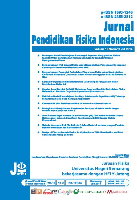
Jurnal Pendidikan Fisika Indonesia-Indonesian Journal of Physics Education
Enhancing Teaching and Learning in Physics TogetherJurnal Pendidikan Fisika Indonesia-Indonesian Journal of Physics Education is a premier open-access journal dedicated to advancing research and pedagogy in the field of physics education. Published by Universitas Negeri Semarang, this journal aims to provide a platform for educators, researchers, and professionals to disseminate innovative teaching practices, empirical studies, and theoretical insights that contribute to the enhancement of physics education globally. With a commitment to accessibility since its inception in 2009, the journal is instrumental in fostering collaboration and knowledge sharing across the international physics education community. The journal not only serves as a vital resource for scholars and practitioners but also plays a significant role in shaping the future of physics teaching and learning in Indonesia and beyond. Researchers and educators are encouraged to submit their manuscripts to engage with the latest trends and research in this dynamic field.

Revista Eureka sobre Ensenanza y Divulgacion de las Ciencias
Unlocking the Future of Science Education TogetherRevista Eureka sobre Ensenanza y Divulgacion de las Ciencias is a premier open-access journal dedicated to advancing the fields of education and science communication. Published by the University of Cadiz in Spain, this journal has established itself as a vital platform since its inception in 2004. With an ISSN of 1697-011X, it aims to disseminate innovative research and pedagogical strategies that enhance the understanding and teaching of scientific disciplines. As of 2023, it holds a Q3 categorization in Education with a Scopus rank of #989/1543, reflecting its commitment to academic excellence and relevance. The journal's open-access model ensures that valuable research is readily available to educators and researchers worldwide, fostering a community engaged in the promotion of effective science education. With a focus on bridging theoretical and practical applications, Revista Eureka invites contributions that spark dialogue and inspire new methodologies in science teaching and dissemination.
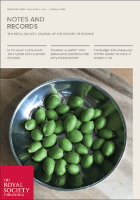
Notes and Records-The Royal Society Journal of the History of Science
Documenting the Journey of Scientific ExplorationNotes and Records - The Royal Society Journal of the History of Science is an esteemed scholarly journal published by the Royal Society in the United Kingdom, focusing on the historical aspects of science and its impact on modern scientific practices. With an ISSN of 0035-9149 and E-ISSN 1743-0178, this journal serves as a vital platform for researchers, professionals, and students who seek to explore the intricate connections between historical developments and contemporary scientific discourse. Recognized for its academic rigor, it holds a commendable position in the Q3 category of the History and Philosophy of Science field, ranking #56 out of 223 according to Scopus, and showcasing a 75th percentile ranking. Covering converged years from 1970 to 1973 and from 1975 to 2024, the journal publishes articles that contribute significantly to the understanding of the evolution of scientific thought. While it currently does not operate under an open access model, its esteemed content continues to engage a broad readership, fostering a deeper appreciation for the history behind scientific innovation and inquiry.